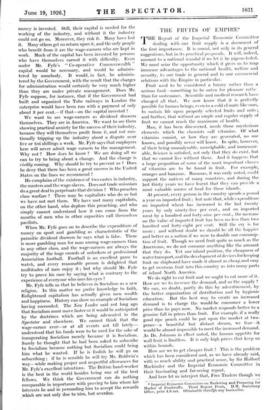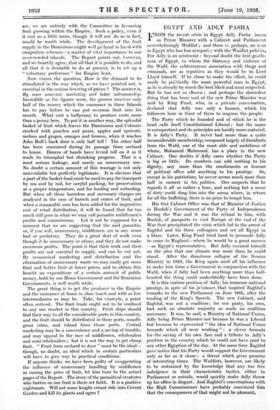THE FRUITS OF EMPIRE*
THE Report of the Imperial Economic Comm ittee dealing with our fruit supply is a document of the first importance. It is sound, not only in its general suggestions, but in its practical proposals. It will, indeed,. amount to a national scandal if we let it be pigeon-holed. We must seize the opportunity which it gives us to reap immense advantages to the national health, welfare and security, to our trade in general and to our commercial relations with the Empire in particular.
Fruit used to be considered a luxury rather than a serious food—something to be eaten for pleasure ratite- than for sustenance. Scientific and medical research have changed all that. We now know that it is perfectly possible for human beings, even in a cold climate like ours, to sustain life upon properly selected fruits and nuts and further, that without an ample and regular supply Of fruit we cannot reach the maximum of health. .
Man, it has been discovered, needs those mysterious elements which the chemists call vitamins. Of what vitamins consist, or how they arc generated, no one knows, and possibly never will know. In spite,. however, of their being unanalysable, unweighable, and immeasim- able, Science is satisfied, not only that they do exist, but that we cannot live without them. And it happens that a large proportion of some of the most important classes. of vitamins are to be found in fruit. For example, oranges and bananas. Bananas, it was early noted, Could support the natives of many countries, and during the last thirty years we have learnt that they can 0-c:wide a most valuable source of food for these islands.
At present, every person in the country spends a pound a year on imported fruit ; but note that, while expenditure on imported wheat has increased in the last twenty years by only ninety-five per cent., and on imported meat by a hundred and forty-nine per cent., the increase on the value of imported fruit has been no less than two hundred and forty-eight per cent. Still the cry is for more ; and without• doubt we should be all the happier and better as a nation if we were to double our consump- tion of fruit. Though we need fruit quite as much as the Americans, we do not consume anything like the amount that they do. Yet our island position, the cheapness of water transport, and the development of devices for keeping fruit on shipboard have made it almost as cheap.and easy to get overseas fruit into this country as into many parts of inland North America.
We do right to eat fruit and we ought to cat more of it.
How are we to increase the demand, and so the supply ? We can, no doubt, partly do this by advertisement, by the better organization of distribution and by hygienic education. But the best way to create an increased demand is to charge the would-be consumer a lower price than he pays now. No market responds better to a genuine fall in prices than fruit. For example. if a really good ripe peach could be put upon the market at two- pence—a beautiful but distant dream, we fear--it would be almost impossible to meet the increased demand. As Dr. Johnson in effect noted, the human appetite for wall fruit is limitless. It is only high prices that keep us within bounds.
- How are wet() get cheaper fruit ? This is the problem which has been considered and, as we have already said, with so much ability and practical sense, by Sir Halford Mackinder and the Imperial Economic Committee in their fascinating and far-seeing report.
And here let us interject that, Free Traders though we
• Imperial Economic Committee on Marketing and Preparing for Market of Foodstuffs. Third Report Fruit, H.M. Stationery Office, price 4/6 net. Obtainable throtrgh any boo:13ellor.
are, we are entirely with the Committee in favouring fruit growing within the Empire. Such a policy, even if it cost us a little more, though it will not do so in fact, would be worth while. The development of the fruit supply in the Dominions might well go hand in hand with emigration schemes—a matter of vital importance to our overcrowded islands. The Report points out, however, and we heartily agree, that all that it is possible to do, and all that it is desirable to do at present, is to set up a " voluntary preference " for Empire fruit.
Now comes the question, How is the demand to be stimulated in the way which, as we have pointed out, is essential in the serious lowering of prices ? The answer is, By more economic marketing and better sal esm amhi p. Incredible as the figures seem, the grower receives only half of the money which the consumer in these Islands has to pay before he can put overseas fruit into his mouth. What cost a halfpenny to produce costs more than a penny here. To put it in another way, the splendid basket of fruit which leaves the Dominions and Colonies stocked with peaches and pears, apples and apricots, melons and grapes, oranges and lemons, when it reaches John Bull's back door is only half full ! The other half has been consumed during its passage from orchard to house. Dozens of hands have levied toll on it as it made its triumphal but shrinking progress. That is a most serious leakage, and surely an unnecessary one. No doubt a certain amount of this wastage is not only unavoidable but perfectly legitimate. It is obvious that a part of the basket-load must be used to pay for transport by sea and by rail, for car; ul packing, for preservation at a proper temperature, and for loading and unloading. But when all these harmless and necessary charges are analysed in the case of barrels and crates of fruit, and when a reasonable sum has been added for the imperative cost of retail distribution, it will be found that far too much still goes in what we may call parasitic middlemen's profits and commissions. Let it not be supposed for a moment that we are suggesting that the said parasitic, or, if you will, unnecessary, middlemen are in any sense bad or predatory. They do a great deal of work even though it be unnecessary or otiose, and they do not make enormous profits. The point is that their work and their profits are not essential to supply, and can be cut out. By economical marketing and distribution and the elimination of unnecessary waste we may easily get more fruit and better fruit at lower prices, and to obtain this benefit an expenditure of a certain amount of public money, both by our Home Government and the Dominion Governments, is well worth while.
The great thing is to get the producer in the Empire and the consumer at home in close touch and with as few intermediaries as may be. Take, for example, a point often noticed. The fruit trade ought not to be confined to any one market in this country. Fruit ships should find their way to all the considerable ports in this country, and the fruit should be distributed in those ports, usually great cities, and inland from those ports. Central marketing may be a convenience and a saving of trouble, and may appeal to the race of middlemen, wholesalers and semi-wholesalers ; but it is not the way to get cheap fruit. " Fruit from orchard to door " must be the ideal— though, no doubt, an ideal which in certain particulars will have to give way to practical conditions.
If anyone thinks we have been guilty of exaggerating the influence of unnecessary handling by middlemen in raising the price of fruit, let him turn to the actual pages of the Report. The story of the parasitical creatures who batten on our fruit is there set forth. It is a positive nightmare. Will not some knight errant ride into Covent Garden and kill its giants and ogres ?











































 Previous page
Previous page